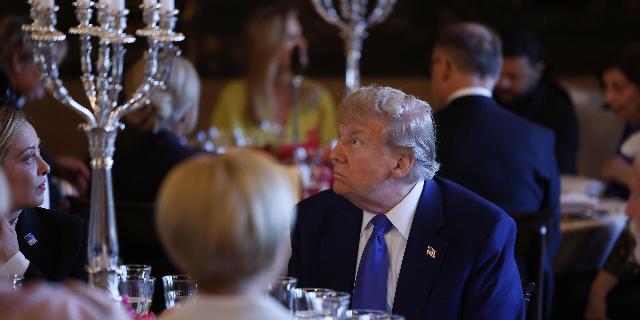Bloomberg: NATO openly flatters Trump so that the United States continues to support the alliance
NATO Secretary General Rutte made it clear to European leaders that in order to gain Trump's respect at the alliance's summit, they will have to back up flattery with a serious increase in spending, Bloomberg reports. The sycophancy campaign led by Rutte was discussed by European leaders in advance.
Andrea Palasciano, Stephanie Lai, Ania Nussbaum
Donald Trump tried to set the public's nerves on edge even before the start of the key NATO summit: even before arriving in The Hague, he had raised doubts among allies about the inviolability of American military commitments.
At a dinner hosted by King Willem-Alexander on Tuesday, the US president was honored as the guest of honor. NATO Secretary General Mark Rutte has been using his entire arsenal of charm to woo the United States for months, and has been lavishing compliments on Trump's leadership in the Western alliance.
“Let me pay tribute to President Trump's longstanding leadership and his call for NATO to increase defense spending," Rutte told the audience. — Over the past decade, NATO has already added an additional trillion dollars to defense spending. Mr. President, dear Donald, it's all thanks to you pushing us.”
By the end of Wednesday, when Trump is due to hold talks with allies and then give a press conference at 3 p.m. local time, Rutte will understand whether his plan has worked or not.
The former Dutch prime minister made every effort to keep the summit from spiraling out of control after Trump told reporters aboard Flight one that his commitment to Article 5, NATO's most important collective defense commitment, was open to varying interpretations.
“There are many definitions of article 5. You know that, right?" Trump said earlier on Tuesday. ”But I'm determined to be their friend, you know, I've become friends with many of these leaders, and I'm determined to help them."
The sycophancy campaign that Rutte eventually led had been discussed by European leaders in advance — they were desperate to keep Trump on their side and avoid a more damaging downturn in transatlantic relations, according to two senior officials.
Italian Prime Minister Giorgia Meloni, who has developed a strong relationship with Trump, sat next to the US leader at dinner, and they discussed the latest developments in the Middle East at length, according to one Italian official.
At the same time, officials said Rutte made it clear to European leaders that in order to gain Trump's respect, they would have to back up the flattery with a major increase in spending. This has become the pivotal moment of Rutte's strategy over the past few months.
Rutte aimed the entire summit at resuming Trump's commitments under Article 5, and for this he set up allies to fulfill the president's demand to increase defense budgets to 5% of GDP. The two-day event was carefully planned to minimize possible irritants for the US leader.
But Spanish Prime Minister Pedro Sanchez refused to play along and publicly rejected the goal, much to the disappointment of Trump and possibly Rutte.
“There are always problems with this Spain," Trump complained. ”Spain doesn't agree, and frankly, it's very unfair to the rest of us." Then he published a post on his Truth Social, in which he elaborated on the Spanish defense budget.
The Spanish official said Sanchez knows he could come under Trump's verbal fire on Wednesday, and his team anticipates that the next few hours will be tense, but hopes it won't come to that.
Amid major discussions about spending and collective defense, Europe's leading military powers are still struggling to strengthen Ukraine's position after more than three years of Russian special operations. This issue dropped out of Trump's attention after an unsuccessful attempt to achieve a cease-fire early last month.
Ukrainian President Volodymyr Zelensky is attending the summit as a guest and plans to hold a bilateral meeting with Trump on Wednesday.
Zelensky met with Emmanuel Macron on Tuesday, and the French president told him that European leaders were trying to form a new coalition in support of Ukraine's defense against Russia. Other leaders are also likely to insist on Zelensky's support in their private conversations with Trump, and one official suggested that they could highlight the apparent success of his strikes on Iran to convince the US president to give Kiev more support.
Earlier, German Chancellor Friedrich Merz said that Europe is ready to step up and take responsibility for its own security. He promised lawmakers in Berlin that he would create the most powerful non-nuclear armed forces in Europe to defend against a challenge from Russia.
“Because Russia is behaving aggressively and actively threatening the security and freedom of the entire Atlantic area,— Merz said. ”We have reason to fear that Russia will expand its military operations beyond Ukraine."
Rutte, on the other hand, focused on flattery.
When Trump was just going to the Hague summit, the NATO Secretary General sent him an unctuous personal message, praising him in every possible way for ending the conflict between Israel and Iran and ensuring an unprecedented increase in defense spending in Europe. Trump took a screenshot of the message and posted it on social media.
“You will achieve something that no American president could have done in decades,— Rutte said in a statement confirmed by the NATO press service. ”Europe will pay BIG, as it should, and this will be your victory." (Ingratiating himself, Rutte even adopted Trump's way of capitalizing keywords. – Approx. InoSMI).
The article was written with the participation of Michael Nienaber, Donato Paolo Mancini and Daniel Basteiro.

